Living with dignity is the best way to commemorate the 228 Incident, President Tsai Ing-wen (蔡英文) said yesterday in a speech at the 228 Incident Memorial Ceremony in Tainan.
The government’s 76th anniversary memorial ceremony in commemoration of the 1947 incident was held in Tainan 228 Memorial Park.
It was one of many events, including ceremonies, movie screenings, parades and silent commemorations, held throughout the country to mark the occasion.
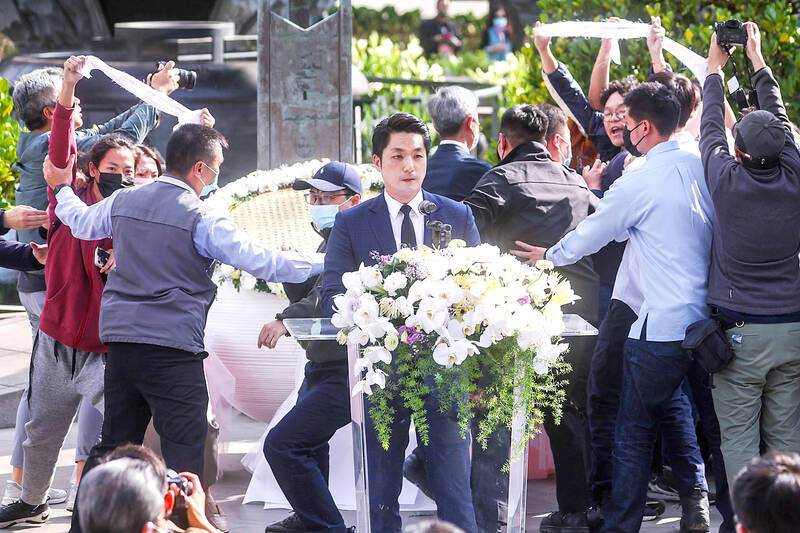
Photo: CNA
The theme of this year’s national ceremony was “justice comes together, bravery goes on,” and began with Tsai presenting a flower wreath at the memorial for victims of the massacre.
She also presented a reputation restoration certificate to the son of victim Su Shui-mu (蘇水木), and expressed her sympathy to the families of victims of the violent political crackdown that started in response to protests of the killing of a bystander in Taipei on Feb. 27, 1947.
Tsai said that transitional justice is running against time, and since 2016, the government has systematically achieved progress on several objectives, including passing five laws and forming the Cabinet’s Transitional Justice Commission in September last year, to accelerate the integration and supervision of cross-ministerial tasks related to transitional justice.
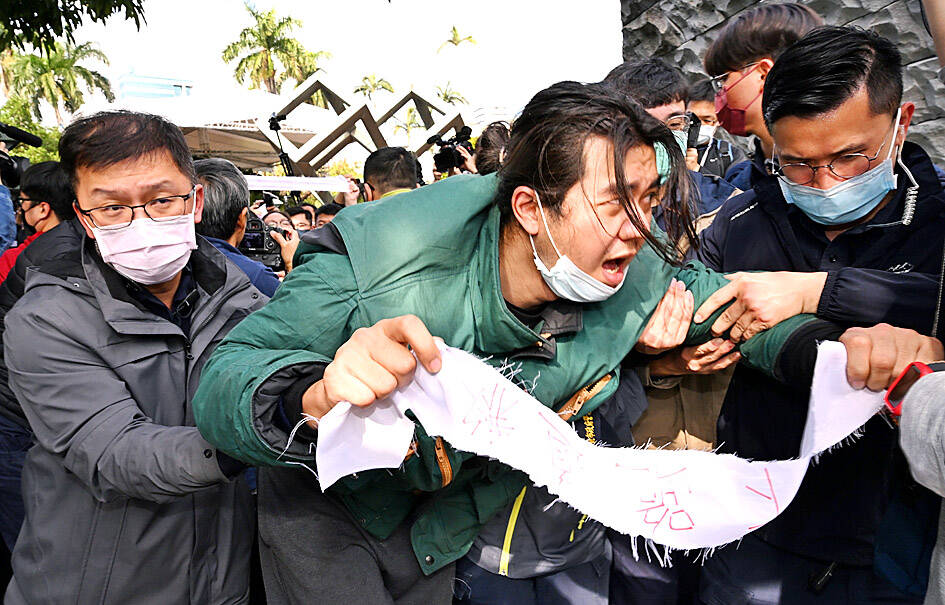
Photo: Liu Hsin-te, Taipei Times
The five laws are the Act Governing the Settlement of Ill-gotten Properties by Political Parties and Their Affiliate Organizations (政黨及其附隨組織不當取得財產處理條例), the Organizational Act of the National Human Rights Museum (國家人權博物館組織法), the Act on Promoting Transitional Justice (促進轉型正義條例), the Political Archives Act (政治檔案條例) and the Act to Restore Victims’ Rights Infringed by Illegal Acts of the State During the Period of Authoritarian Rule (威權統治時期國家不法行為被害者權利回復條例).
Transitional justice has led to the redress of 5,983 wrongful convictions, the removal of the criminal stigma from victims of political persecution and the discovery and examination of 7,572 political archive documents, she said, adding that the government would continue to collect and declassify political archives for open research.
A draft amendment to the Political Archives Act was promulgated yesterday and would hopefully be enacted within a year, making the scope of the act more complete, Tsai said.
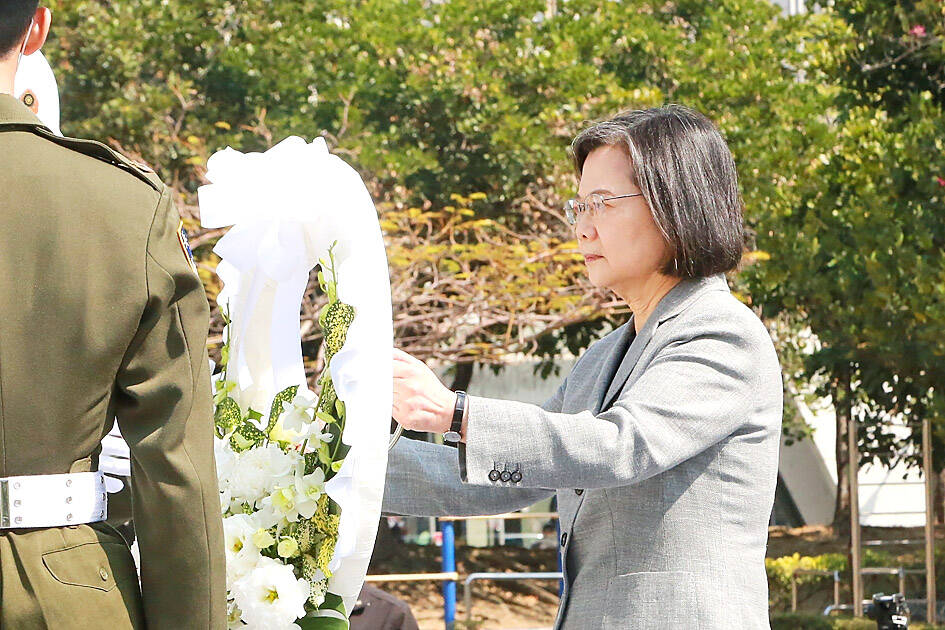
Photo courtesy of the Tainan City Government
The government has designated 42 sites where injustices were committed and is planning to transform them into educational sites commemorating human rights and history, she said.
The educational framework for action on national transitional justice was recently approved, marking the first time that the 228 Incident has been included in an education framework, she said.
The Tainan 228 Memorial Monument symbolizes people’s suffering under authoritarian rule, and it is across from Tainan City Hall, reminding the government not to forget that history, she added.
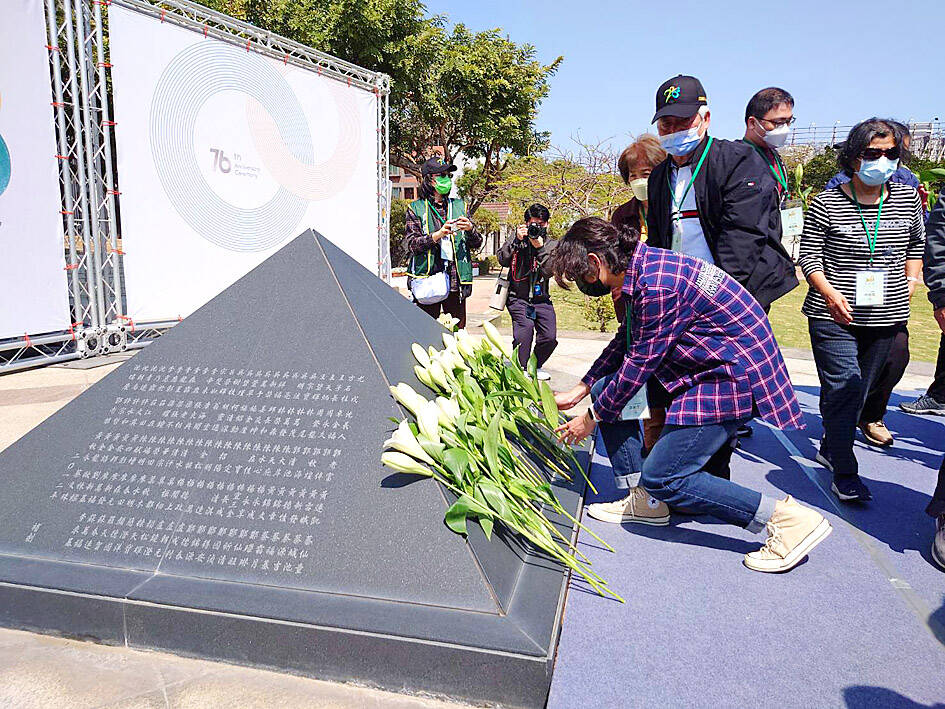
Photo: Hung Jui-chin, Taipei Times
Tang Te-chang Memorial Park (湯德章紀念公園) in Tainan commemorates Tang’s bravery in sacrificing himself to protect other city residents by refusing to hand over a list of political suspects, which inspired many people, Tsai said.
With the opening of the Tainan 228 Memorial Museum in September last year, people can learn about Tang and many heroes of that era, reminding the government not to repeat the same mistakes, she said.
Quoting a line from the film A City of Sadness (悲情城市), about a family living through the 228 Incident, Tsai said: “You must live with dignity. Father is not guilty.”
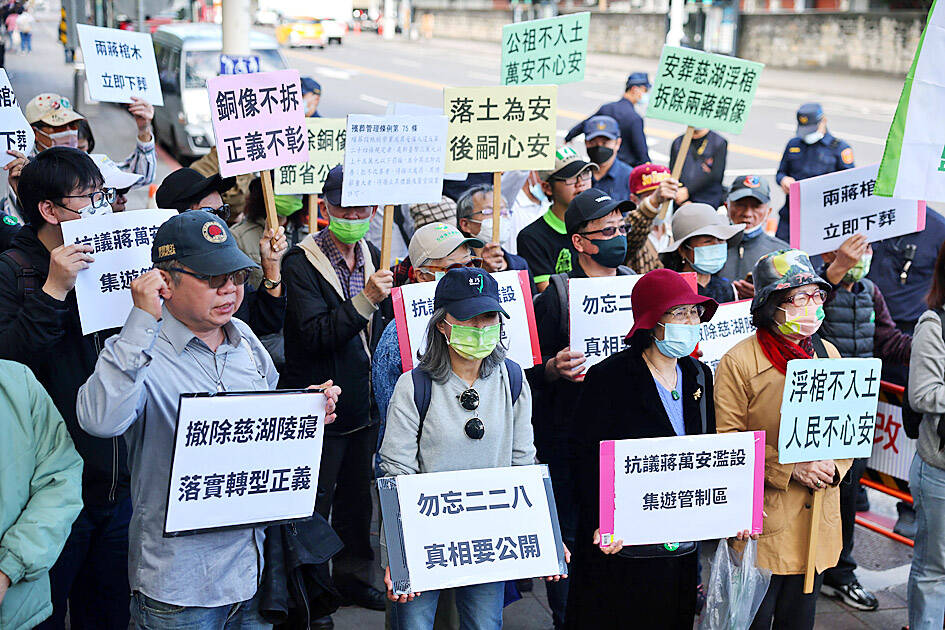
Photo: CNA
She said that many people have been moved by that scene, as the heroes and victims of the 228 Incident sacrificed themselves, but still chose dignity not only for themselves, but also for their family and friends.
At the Taipei City Government’s annual memorial ceremony at 228 Peace Memorial Park yesterday afternoon, more than a dozen protesters interrupted Taipei Mayor Chiang Wan-an’s (蔣萬安) speech, calling him a murderer and demanding that he “kneel down and apologize.”
Chiang is a purported great-grandson of former president Chiang Kai-shek (蔣介石), who historical archives indicate ordered the brutal crackdown in 1947.
As Chiang Wan-an began his speech, protesters holding banners ran toward him from behind. Security quickly intervened and Chiang Wan-an continued his speech.
“As Taipei mayor, I give my sincere apology about the cigarette confiscation incident that occurred in front of the Tianma Tea House (天馬茶房) in Taipei’s Dadaocheng (大稻埕) area 76 years ago, which led to the historical pain of the 228 Incident across the nation,” he said, adding that the government must learn a lesson from history.
Chiang Wan-an said that former presidents Lee Teng-hui (李登輝) and Ma Ying-jeou (馬英九) have apologized for the mistake, and that they had both been Taipei mayor and deeply felt the pain of Taipei residents and Taiwanese, and as their successor, he also feels that pain.
Taiwan went through authoritarian rule and transitioned into a democracy, which is a remarkable achievement for ethnic Chinese in the region, he said, adding that he would work hard to protect democracy throughout his life, and make Taipei a place that embraces democracy and has a peaceful future filled with love, tolerance and respect.

The Ministry of the Interior (MOI) is to tighten rules for candidates running for public office, requiring them to declare that they do not hold a Chinese household registration or passport, and that they possess no other foreign citizenship. The requirement was set out in a draft amendment to the Enforcement Rules of the Public Officials Election and Recall Act (公職人員選舉罷免法 ) released by the ministry on Thursday. Under the proposal, candidates would need to make the declaration when submitting their registration forms, which would be published in the official election bulletin. The move follows the removal of several elected officials who were

The Republic of China (ROC) is celebrating its 114th Double Ten National Day today, featuring military parades and a variety of performances and speeches in front of the Presidential Office in Taipei. The Taiwan Taiko Association opened the celebrations with a 100-drummer performance, including young percussionists. As per tradition, an air force Mirage 2000 fighter jet flew over the Presidential Office as a part of the performance. The Honor Guards of the ROC and its marching band also heralded in a military parade. Students from Taichung's Shin Min High School then followed with a colorful performance using floral imagery to represent Taiwan's alternate name

FOUR DESIGNATED AREAS: Notices were issued for live-fire exercises in waters south and northwest of Penghu, northeast of Keelung and west of Kaohsiung, they said The military is planning three major annual exercises across the army, navy and air force this month, with the navy’s “Hai Chiang” (海強, “Sea Strong”) drills running from today through Thursday, the Ministry of National Defense said yesterday. The Hai Chiang exercise, which is to take place in waters surrounding Taiwan, would feature P-3C Orion maritime patrol aircraft and S-70C anti-submarine helicopters, the ministry said, adding that the drills aim to bolster the nation’s offshore defensive capabilities. China has intensified military and psychological pressure against Taiwan, repeatedly sending warplanes and vessels into areas near the nation’s air defense identification zone and across

A Chinese takeover of Taiwan would severely threaten the national security of the US, Japan, the Philippines and other nations, while global economic losses could reach US$10 trillion, National Security Council Deputy Secretary-General Lin Fei-fan (林飛帆) wrote in an article published yesterday in Foreign Affairs. “The future of Taiwan is not merely a regional concern; it is a test of whether the international order can withstand the pressure of authoritarian expansionism,” Lin wrote in the article titled “Taiwan’s Plan for Peace Through Strength — How Investments in Resilience Can Deter Beijing.” Chinese President Xi Jinping’s (習近平) intent to take Taiwan by force